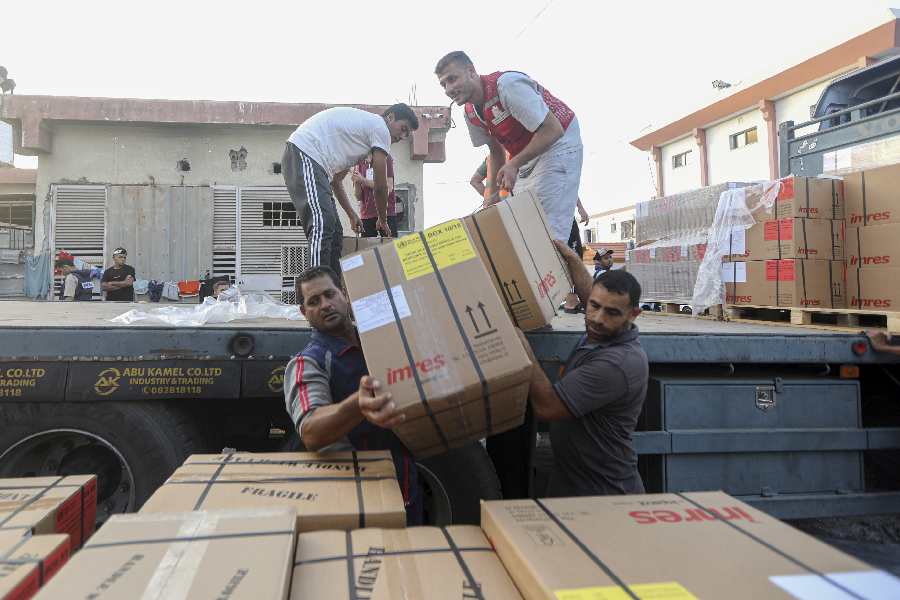As Israel warns of a monthslong war and steps up an onslaught of airstrikes on the Gaza Strip, it has trapped 50,000 pregnant women in a humanitarian nightmare, according to estimates from the United Nations’ sexual and reproductive health agency, known as UNFPA. Some 5,500 of these women are expected to give birth in the next month and are facing the prospect of doing so on their own, as Gaza’s health system buckles under the Israeli blockade and as intensified airstrikes make traveling to any medical facility a perilous ordeal.
Dominic Allen, the UNFPA representative for the state of Palestine, said Monday that individually packaged emergency delivery kits for at least half the women expected to give birth soon remain held up in the humanitarian aid convoys waiting in Egypt for permission to enter Gaza.
The kits are spartan. Each resealable plastic bag holds one bar of soap, a plastic sheet measuring about 40 inches by 40 inches, a pair of scissors for cutting the umbilical cord, three pieces of umbilical tape, two cotton cloths for cleaning and covering the mother and child, a pair of latex exam gloves and an instruction pamphlet to guide women through their deliveries.
UNFPA considers the kits a “last resort” to prevent infection during delivery in the absence of safe or reliable access to a health care facility, but that circumstance has become the norm in Gaza since the war began. And as their deliveries approach, many of the pregnant women “don’t know where they’re going to be in the next minute or the next day,” Allen said.
An estimated 19,000 pregnant women were among more than 1 million people ordered by Israel to leave northern Gaza last week, according to the Palestinian Family Planning and Protection Association, a nonprofit member of the International Planned Parenthood Federation. The group said in a statement that women in Gaza have been losing their babies from the stress and shock of the war.
Itimad Abu Ward, a midwife and nurse who works as a public health officer for the World Health Organization, was among those forced to flee northern Gaza. She said trying to care for pregnant women during the chaotic journey south was near impossible.
In a phone interview from Khan Younis, in the southern Gaza Strip, Abu Ward said she met a pregnant woman at a United Nations shelter last week who urgently needed to get to a hospital — she was in labor, and had been complaining about decreased fetal movement.
But it took two days to find safe transportation and an open bed for the woman at the nearby Nasser Hospital, Abu Ward said. She feared she would not be able to help patients in similar situations.
Abu Ward spoke to the Times from the Khan Younis Training Center, where an estimated 17,000 displaced people are sheltering in dire, overcrowded conditions with limited water and sanitation facilities.
As the center’s electricity flickered on and off and explosions boomed outside, she said the few medical supplies — gloves, umbilical cord ties, clean towels — that she was able to bring when her family left their home in Jabaliya would not be enough to save a pregnant woman if she began hemorrhaging.
Even the donated first aid kit that Abu Ward has been using to treat minor injuries in the center lacks basic tools including thermometers, she said, and when she recently treated a new mother and her feverish 25-day-old baby, she was forced to estimate the baby’s temperature by hand.
Gaza’s hospitals and maternity wards, starved of water and fuel, are not much better equipped. Medicines for potentially life-threatening pregnancy complications, such as magnesium sulfate for treating pre-eclampsia, are running low and cannot be replenished unless more humanitarian aid is allowed in, said Allen, the UNFPA representative.
Also held up in the aid convoy are desperately needed supplies for Gaza’s medical personnel to perform basic obstetric procedures, such as suturing perineal tears, and more complex ones, including delivering a baby by cesarean section, he said.
Abu Ward said that unless such aid, and more of it, is allowed in, and until pregnant women in Gaza can safely resume regular pre- and postnatal appointments, she expected maternal mortality rates to rise.
“We are trying to help as much as we can, but sometimes, we can’t,” she said. “The future is very, very dark.”
The New York Times News Service










